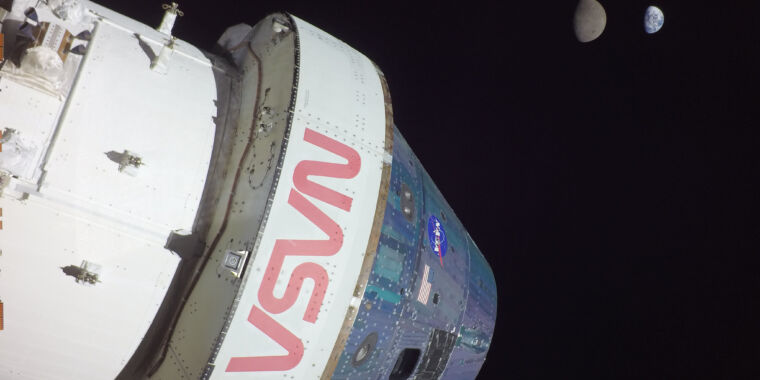NASA
NASA’s acting inspector general, George A. Scott, released a report Wednesday that provided an assessment of NASA’s readiness to launch the Artemis II mission next year. This is an important flight for the space agency because, while the crew of four will not land on the Moon, it will be the first time humans have flown into deep space in more than half a century.
The report did not contain any huge surprises. In recent months the biggest hurdle for the Artemis II mission has been the performance of the heat shield that protects the Orion spacecraft during its fiery reentry at more than 25,000 mph from the Moon.
Although NASA downplayed the heat shield issue in the immediate aftermath of the uncrewed Artemis I flight in late 2022, it is clear that the unexpected damage and charring during that uncrewed mission is a significant concern. As recently as last week, Amit Kshatriya, who oversees development for the Artemis missions in NASA’s exploration division, said the agency is still looking for the root cause of the problem.
This week’s report from the inspector general—an independent office charged with investigating crime, fraud, waste, and mismanagement involving NASA programs—provides some additional details but does not change the overall conclusion. The unresolved issues with the heat shield pose a significant risk to NASA’s plans to launch Artemis II in September 2025. Probably the most notable new information came in the form of two images that showed previously undisclosed details about the deep divots in the Orion heat shield after Artemis I.
A bit peeved
However, what was striking about this report is NASA’s response. Buried at the end, on page 36, there is a distinct tone of petulance in the remarks from Catherine Koerner, the associate administrator for Exploration Systems Development Mission Directorate. Her role at NASA, in effect, is to oversee development of Orion and other hardware used for missions into deep space.
After concurring with each of the six recommendations in the inspector general’s report, Koerner made the following comment:
“NASA is dedicated to continuous enhancement of our processes and procedures to ensure safety and address potential risks and deficiencies,” she wrote. “However, the redundancy in the above recommendations does not help to ensure whether NASA’s programs are organized, managed, and implemented economically, effectively, and efficiently.”
A careful reading of the second sentence reveals that Koerner feels that the inspector general’s efforts are both redundant and unhelpful. This is not accidental language. Koerner’s response was certainly reviewed by NASA’s senior managers, who could have flagged and removed the text. And yet they went through with it.
So what’s going on here?
NASA officials are clearly feeling the pressure when it comes to Artemis. The second mission, a flyby around the Moon, is supposed to be the relatively easy one. The really difficult mission, a lunar landing involving Orion docking with SpaceX’s Starship in lunar orbit, is much more ambitious. Politically, there is a lot of pressure to deliver on both, and Congress is watching closely as NASA faces probable delays.
This week, during a hearing of the House Science, Space, & Technology Committee to consider NASA’s budget for fiscal year 2025, the very first question from Chairman Frank Lucas concerned possible changes to Artemis III. Referring to an article in Ars Technica about NASA’s internal deliberations about modifying the mission profile to have Orion and Starship dock in low-Earth orbit, Lucas asked the NASA administrator what was happening.

